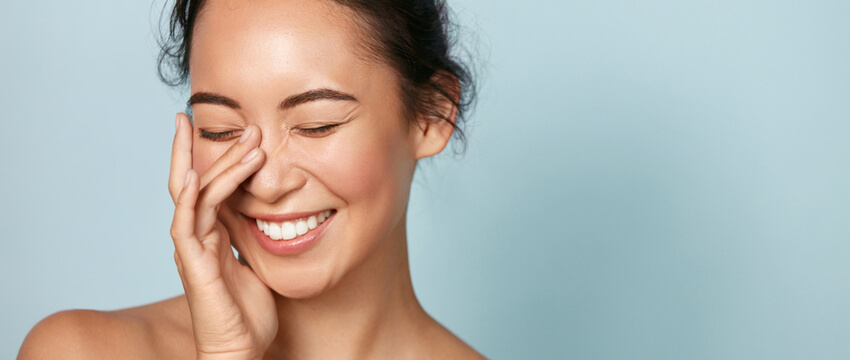Want to look different but don’t want to undergo several facial cosmetic surgeries just to do so? Some people would go ahead and ask about rhinoplasty, a cosmetic surgery procedure that alters the shape, size, angle, and profile of the nose. This is a very popular procedure because just one surgery can affect the contour and overall look of your face. But, should I get a nose job? In considering this surgical procedure, learn about its ups and downs including the procedure, the risks and complications, the expected outcomes, and everything else that needs to be taken into account about rhinoplasty.
Rhinoplasty: A quick rundown
What is rhinoplasty?
Nose job surgery, medically termed as rhinoplasty, is a plastic surgery procedure that alters the shape, size, height, and angle or profile of the nose by manipulating the nasal skin, bones, and cartilages. For some who are afraid of undergoing the surgery, there is now an option to have nonsurgical rhinoplasty, also called injection or liquid rhinoplasty. It is performed by injecting dermal fillers to the nose to straighten and remove the hump on the nose bridge. This may be effective for some, but it is not a permanent fix compared to the surgical option.
What can rhinoplasty treat?
Depending on your need and preference, your rhinoplasty surgeon could customise your nose job surgery in order to address the improvements that you want to have for your nose. They have the right techniques and manipulations to do the following alterations:
Remove a hump on the nose bridge
- Straighten the bridge
- Reshape the nasal tip
- Increase or decrease the size of the nostrils
- Correct the nose’s function and position after an injury
- Mend congenital defects that affect the respiratory function of the nose
- Open breathing passages
- Make the nose look bigger or smaller
What are the common risks and complications of rhinoplasty?
Should I get a nose job? For a person who needs or wants to have a nose job, he or she needs to know the common complications that can happen during or after the rhinoplasty surgery. Because the decision to undergo this nose job surgery, or any kind of plastic surgery procedure, should be personal, you should take into account what your body could experience as a result of taking the risk and improving or enhancing your nose. Here are some of the most common risks and complications patients face with rhinoplasty:
- Risk of anaesthesia side effects
- Risk of developing infection post-surgery
- Excessive bleeding
- Poor wound healing (making the patient vulnerable to infection)
- Scar formation (especially for open rhinoplasty)
- Reported numbness or tingling sensation on the nose (nasal tip)
- Persistent pain and tenderness
- Difficulty breathing (because of swelling or other complications)
- Dissatisfied results of nasal manipulation
- Skin bruising and swelling
- Nasal septal perforation (a hole in the nasal septum)
- Possibility of secondary or revision surgery
These conditions should be greatly explained and handled by your trusted rhinoplasty surgeon as early as your initial consultation. This makes it easier and safer for you to decide if you would want to push through with the plastic surgery procedure or not.
Should I get a nose job?
No one can dictate to you the correct answer to this question. It is really in your hands whether you would pursue undergoing a surgical enhancement of your nose or not. What matters is the fact that if you really decide to undergo one, you are prepared and are considered a good candidate for a nose job surgery. How do you know that? Well, doctors have several criteria to know if a person can safely undergo rhinoplasty. This includes:
A healthy medical history

Appropriate age
It is recommended for patients to be at least 16 or 17 years of age before undergoing rhinoplasty. This age is when most men and women achieve maturity in the growth and development of their nose, so the final results will not be affected by any other bodily changes.
Realistic expectations of the procedure
The number one fact that a patient should know before a rhinoplasty surgery is no nose is perfect. So if you are planning of undergoing a nose job surgery because you want a perfect nose that resembles that of your favourite celebrity, then rhinoplasty may not be the surgery for you because it will not give you the same results that you are expecting.


 Remove a hump on the nose bridge
Remove a hump on the nose bridge
Recent Comments